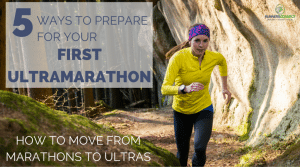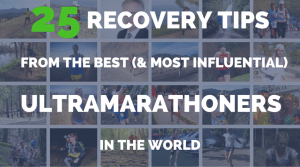There are very few ‘ultra marathon training plans for beginners’ around for ultramarathon runners and there’s a reason for that.
There are so many variables involved that it’s impossible to come up with a ‘one size fits all’ plan. When you’re training for an ultra distance run you need to become your own coach.
Whilst technically an ultra distance run is anything over 26.2 miles, that’s the only thing they have in common. Distances can be anything from 50km to 200km (and more), and terrains vary from relatively flat roads through to alpine adventures at altitude.
Races can take anything from 5 hours through to 24 hours or longer.
Now:
The only way to prepare for an ultra is to choose an event, research and understand the characteristics of it (distance, terrain, weather, temperature, route stages etc) and prepare accordingly.
Whilst you need to understand the nuances of your race, you also need to know your body, how you respond and recover from training and what you will need to get through training and get to the finish line.
Combining an understanding of the challenges of the race and what YOU need to do to get there is the key.
Becoming an expert in YOUR body is one of the most important aspects of becoming an ultra runner.
Sure, you can employ a coach or follow a training plan, but no-one knows your body as well as you do.
Only you know how much mileage you can tolerate before you break down.
Only you know how much sleep you need, how long it takes you to recover from long runs, how much you can cross train and how you can handle back to back runs.
So, train, learn and listen to what your body is telling you… you are your best coach.
So what you won’t find in this article is a training plan. Instead, I’ve turned to an expert in the shape of Damian Hall for some tips. Today, we are going to answer all the questions you might have about racing an ultra, and leave you feeling confident and excited for your next (or first) ultra race.
But first, who is Damian?
An inspirational and accomplished ultra runner from the UK, Damian recently (in June 2016) set a new ‘Fastest Known Time’ for the South West Coast Path (630 miles).
Damian will also be competing for Great Britain and Northern Ireland in the World Trail Championships in October 2016.
Ultras are becoming very popular. Can anyone run one?
Absolutely.
Any able-bodied person can run an ultra.
Most of it is in the head and you run very slowly – 10-minute miles are comparatively speedy in the latter stages of a longer race.
You won’t believe this:
Walking breaks aren’t just accepted, but encouraged and there’s loads of cake to eat. I’d encourage everyone to try it.
It’s easier than you think and addictively satisfying.
The joys and possibilities of distance running have changed my life.
How much time do you need to train for your first ultra?
A good friend of mine completed his first ultra this year on 1-2 runs a week.
He got his long run in – building gradually to marathon distance (the race was 33 miles) – but for family reasons couldn’t manage much else.
Ideally it might be three-six runs a week, but the key run is the long run, though again it doesn’t need to be crazy miles.
Getting used to running for two hours, then three hours, would be a good start.
These sessions can be slow and include walk breaks.
How many ultras can you do in one year?
I have friends who might do 10, but most coaches wouldn’t advise that.
It’s a lot of stress on the body. Most of the best ultramarathoners in the world do not even do that many (and we know, cause we rounded up 25 of them to give us ultramarathon recovery tips!)
I’d say up to five is a sensible amount, broadly speaking, though probably not in a first year of ultra running.
Though of course a 30-mile ultra has a very different effect on your body than a 100-miler or a multi-stage (ie multi-day race), which you need to allow more recovery from.
I will do four this year, plus my 10-day Fastest Known Time race.
But remember:
My body’s used to this kind of thing now.
How do I know how many miles should I run per week for my ultramarathon? Or do you recommend more of a ‘make it up as you go’ approach?
No real formula.
Most runners could finish a first ultra of a moderate distance of 30-40 miles a week.
No, really.
It’s wise to have a structured training program to help build up sensibly and peak at the right time.
Finding a coach you can trust is going to make a big difference in staying injury free.
The often-parroted 10 per cent rule seems fairly sensible as a rough guide. If you jump up more than that, have an easier week afterwards.
Run off-road, too, and you’re much less likely to get injured in my experience.
Consistency really seems to pay off too.
What’s the longest run you should do to in training to prepare for an ultramarathon? Should you aim to run the complete distance of the race?
I wouldn’t recommend doing much more than 30 miles in a single training run, as fatigue from that will probably impact the following week’s sessions and increase the chance of injury.
So, no, it’s usually unwise to run the race distance in training, for the same reasons.
It makes sense, too, to build up race distances.
So I wouldn’t encourage anyone to sign up for a 100 miler as a first ultra, rather perhaps something in the 30-40-mile range, then 60-70 and so on.
Is speedwork important for ultra runners?
Yes, definitely.
If you only run long you’ll likely only have one pace, which will be a slow one and you’ll be on your feet longer, increasing the chance of things going wrong, such as blisters, muscle soreness and black toenails.
What are back-to-back runs and why are they important?
A back-to-back run is doing two long runs on consecutive days, but unless you’re training for a multi-stage race, they’re not essential.
We are huge fans of these at RunnersConnect, and believe they are what will make you race better at almost every distance.
They are useful for teaching your body – and mind – what it’s like to leave the door sore, to run on tired legs.
This is important:
But again there’s more risk of injury and fatigue so they need to be approached with caution.
It’s sensible to do one, if not both, off road and keep the pace slow initially. And again build up gradually.
Don’t start with 20 miles following by 20 miles.
The runners boasting about huge training runs on social media are often the ones getting injured and DNFing at races, so don’t believe all ultra runners are running 100-mile weeks.
Should you run some marathon races as part of training for an ultramarathon?
Clothing, shoes, and fueling choices are more important in ultra races than marathons, so a B race or two can be really useful for testing these out.
Plus they work well as long training runs.
A trail marathon, even a half, wearing a pack and full kit (ultras tend to have mandatory kit list), is an ideal B race for a shorter ultra.
RunnersConnect Bonus
Download your FREE Ultra Runners Checklist.
Giving you an easy to follow, printable list of the 9 steps to follow as you prepare for your first (and every) ultra marathon.
Is the taper important in ultras? How should I taper for an ultramarathon?
Yes, definitely.
You want to start an ultra well rested.
Most ultra runners do around three-two weeks of tapering, usually keeping the frequency of runs, but reducing volume.
Hardly anyone sleeps well the night before a big race, so try to get good rest on the two-three nights beforehand.
Should you just run? Or do any cross training or weight training?
Cross training is very sensible – I hike and cycle – especially for those training in high volume, perhaps 50 miles per week or more.
Strength work – especially lunges and squats – is really worthwhile too and has definitely helped me (develop a bigger, rounder and firmer backside!).
I do some every day.
If weight training is involved, and for most runners they aren’t, then it should be concentrated on core strength.
Free weights are much better than machine weights as they utilize the whole kinetic chain rather than muscles or muscle groups in isolation.
What sort of pace should you do your long runs? Do you use heartrate?
In a periodised training structure, heart rate training can be really useful in ensuring you build up a base of endurance slowly and carefully.
Generally long runs should be slow and feel easy, conversational.
Towards race day though, you might sharpen them up with some of the miles at race pace.
Is it ok to walk in an ultramarathon?
This is one of the secrets of ultra running.
We all walk at times.
It’s great for a little recovery or to take on fuel.
More competitive or elite ultra runners might only hike the really steep stuff, but most ultra runners hike the uphills.
Though actually it’s the downhills where you can batter your quads and make things hard for yourself.
Some runners may find themselves walking more towards the end of a race.
The secret is to keep that to an efficient, speed-hiking pace, rather than a leisurely Sunday-afternoon ramble pace.
Sometimes when you start walking it’s hard to get running again.
What would be the one most important piece of advice you’d give to a new ultra runner?
Finishing an ultramarathon is much more about the size of your willpower than the size of your muscles.
If you feel bad, slow down a bit, eat and drink and tell yourself it never always gets worse.
Smile and enjoy it.
You’re out running all day somewhere pretty and eating lots of cake.
Few things are better than that. Plus the sense of achievement at the end is effing awesome and makes it all worthwhile.
Feel ready to go?
If you need more ultramarathon advice, be sure to read our training guide for ultras and make sure you do these 9 things before your first ultramarathon.
Then once you accomplish your goal, and complete that race you enevr thought you could do, be sure to follow the advice of 25 of the best ultra runners in the world to recover correctly.
Because otherwise your mind will bounce back far quicker than your body, and your next ultramarathon will already be picked out, before you have even managed an easy run!






